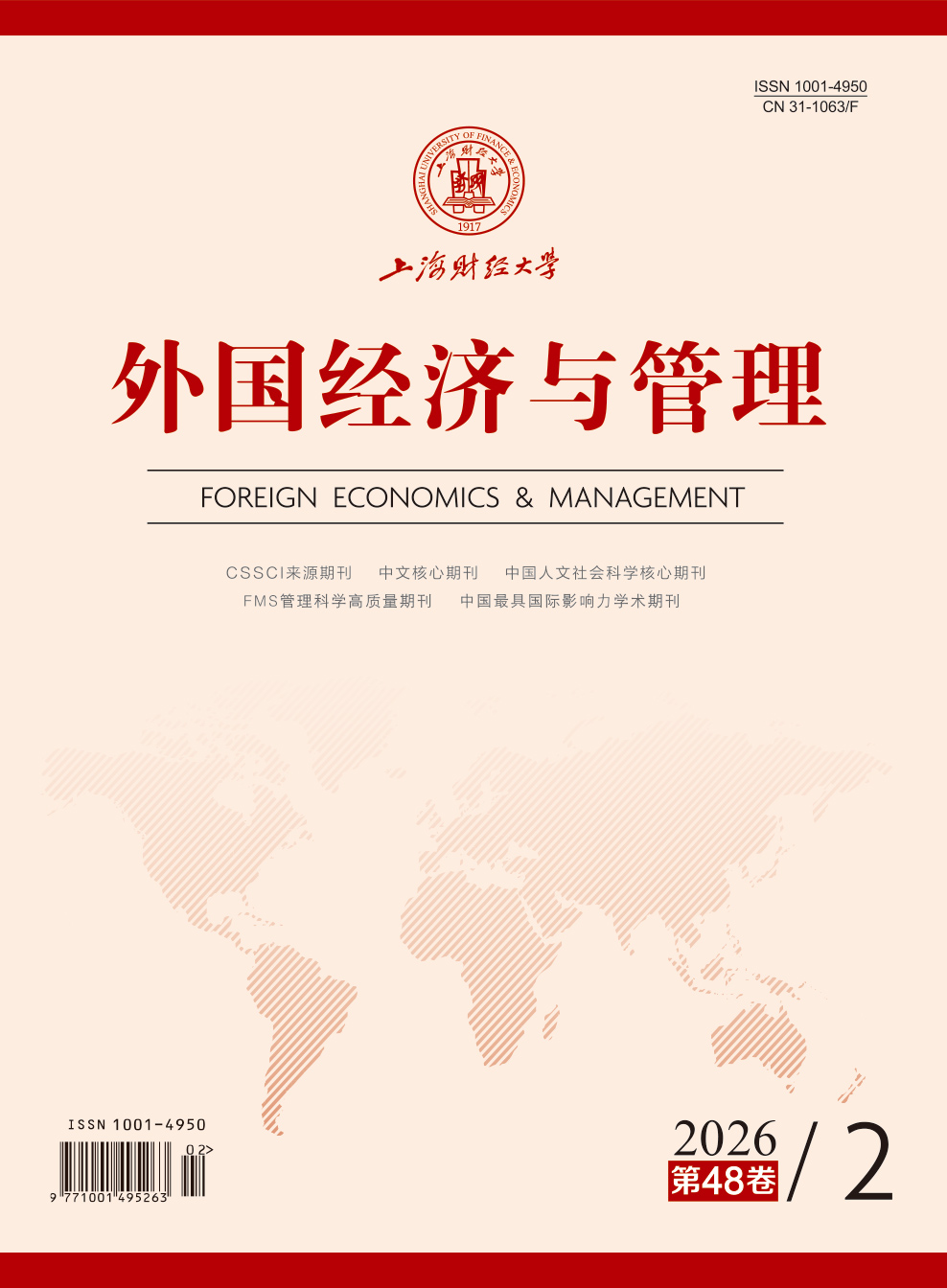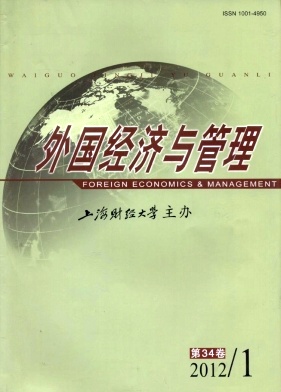中国情境下的创业研究现状探析与未来研究建议
外国经济与管理 2012 年 第 34 卷第 01 期, 页码:1 - 9
摘要
参考文献
摘要
创业研究是一个新兴但又发展迅速的研究领域,目前基于中国情境的创业研究越来越受到关注,主流英文管理学术期刊相继推出专门讨论中国创业问题的专辑。本文在文献梳理的基础上,首先探讨了创业研究作为学术研究领域的定位问题,然后详细分析了中国情境下的创业研究学术贡献来源,剖析了中国情境下的创业研究进展状况,最后提出了关于未来研究的建议,目的在于加强由理论驱动的创业研究,并及时把创业研究的理论成果运用于创业实践。
[1]Aldrich H E.Organizations evolving[M].Thousand Oaks,CA:Sage,1999:77.
[2]Bian Y,et al.Occupation,class,and social networks in urbanChina[J].Social Forces,2005,83(4):1443-1468.
[3]Boisot M and Child J.From fiefs to clans and network capita-lism:Explaining China’s emerging economic order[J].Ad-ministrative Science Quarterly,1996,41(3):600-628.
[4]Busenitz L,et al.Entrepreneurship research in emergence:Past trends and future directions[J].Journal of Management,2003,29(3):285-308.
[5]Child J and Mllering G.Contextual confidence and activetrust development in the Chinese business environment[J].Organization Science,2003,14(1):69-80.
[6]Connelly B L,et al.The power and effects of entrepreneurshipresearch[J].Entrepreneurship Theory and Practice,2010,34(1):131-149.
[7]Gartner W B and Birley S.Introduction to the special issue onqualitative methods in entrepreneurship research[J].Journalof Business Venturing,2002,17(5):387-395.
[8]Holt D H.A comparative study of values among Chinese andUS entrepreneurs:Pragmatic convergence between contrastingcultures[J].Journal of Business Venturing,1997,12(6):483-505.
[9]Li J J,et al.Do managerial ties in China always produce va-lue?Competition,uncertainty,and domestic vs.foreign firms[J].Strategic Management Journal,2008,29(4):383-400.
[10]Li Y,et al.Moderating effects of entrepreneurial orientationon market orientation-performance linkage:Evidence fromChinese small firms[J].Journal of Small Business Manage-ment,2008,46(1):113-133.
[11]Ma R,et al.Social networks and opportunity recognition:Acultural comparison between Taiwan and the United States[J].Strategic Management Journal,2011,32(11):1183-1205.
[12]Nee V.Organizational dynamics of market transition:Hybridforms,property rights and mixed economy in China[J].Ad-ministrative Science Quarterly,1992,37(1):1-27.
[13]Nolan P.China’s rise:Russia’s fall[M].London:Macmil-lan,1995.
[14]Peng M W.Institutional transitions and strategic choices[J].Academy of Management Review,2003,28(2):275-296.
[15]Romer,P M.Increasing returns and long-run growth[J].Journal of Political Economy,1986,94(5):1002-1037.
[16]Slotte-Kock S and Coviello N.Entrepreneurship research onnetwork process:A review and ways forward[J].Entrepre-neurship Theory and Practice,2010,34(1):31-57.
[17]Solow R M.A contribution to the theory of economic growth[J].Quarterly Journal of Economics,1956,70(1):65-94.
[18]Tan J,et al.Particularistic and system trust among small andmedium enterprises:A comparative study in China’s transi-tion economy[J].Journal of Business Venturing,2009,24(6):544-557.
[19]Tang J,et al.Exploring an inverted U-shape relationship be-tween entrepreneurial orientation and performance in Chineseventures[J].Entrepreneurship Theory and Practice,2008,32(1):219-239.
[20]Weick K E.What theory is not,theorizing is[J].Adminis-trative Science Quarterly,1995,40(3):385-390.
[21]Xin K R and Pearce J L.Guanxi:connections as substitutesfor formal institutional support[J].Academy of ManagementJournal,1996,39(6):1641-1658.
[22]Yang J Y and Li J.The development of entrepreneurship inChina[J].Asia Pacific Journal of Management,2008,25(2):335-359.
[23]陈晓红等.创业知识资本与企业绩效关系研究[J].科学学研究,2009,(5):759-764.
[24]费孝通.乡土中国[M].三联书店1985年版.
[25]马鸿佳等.创业导向、小企业导向与企业绩效关系研究[J].管理世界,2009,(9):109-115.
[26]杨俊,张玉利.新生创业者是谁及其如何创业——阶层观点与调查发现[J].中国社会科学(内部文摘),2010,(6):24-40.
[27]杨俊等.关系强度、关系资源与新企业绩效——基于行为视角的实证研究[J].南开管理评论,2009,(3):44-54.
[28]张玉利,李乾文.公司创业导向、双元能力与组织绩效[J].管理科学学报,2009,(1):137-152.
[29]张玉利,王晓文.先前经验、学习风格与创业能力的实证研究[J].管理科学,2011,(3):1-12.
[30]张玉利,杨俊,任兵.社会资本、先前经验与创业机会——一个交互效应模型及其启示[J].管理世界,2008,(7):91-102.
[2]Bian Y,et al.Occupation,class,and social networks in urbanChina[J].Social Forces,2005,83(4):1443-1468.
[3]Boisot M and Child J.From fiefs to clans and network capita-lism:Explaining China’s emerging economic order[J].Ad-ministrative Science Quarterly,1996,41(3):600-628.
[4]Busenitz L,et al.Entrepreneurship research in emergence:Past trends and future directions[J].Journal of Management,2003,29(3):285-308.
[5]Child J and Mllering G.Contextual confidence and activetrust development in the Chinese business environment[J].Organization Science,2003,14(1):69-80.
[6]Connelly B L,et al.The power and effects of entrepreneurshipresearch[J].Entrepreneurship Theory and Practice,2010,34(1):131-149.
[7]Gartner W B and Birley S.Introduction to the special issue onqualitative methods in entrepreneurship research[J].Journalof Business Venturing,2002,17(5):387-395.
[8]Holt D H.A comparative study of values among Chinese andUS entrepreneurs:Pragmatic convergence between contrastingcultures[J].Journal of Business Venturing,1997,12(6):483-505.
[9]Li J J,et al.Do managerial ties in China always produce va-lue?Competition,uncertainty,and domestic vs.foreign firms[J].Strategic Management Journal,2008,29(4):383-400.
[10]Li Y,et al.Moderating effects of entrepreneurial orientationon market orientation-performance linkage:Evidence fromChinese small firms[J].Journal of Small Business Manage-ment,2008,46(1):113-133.
[11]Ma R,et al.Social networks and opportunity recognition:Acultural comparison between Taiwan and the United States[J].Strategic Management Journal,2011,32(11):1183-1205.
[12]Nee V.Organizational dynamics of market transition:Hybridforms,property rights and mixed economy in China[J].Ad-ministrative Science Quarterly,1992,37(1):1-27.
[13]Nolan P.China’s rise:Russia’s fall[M].London:Macmil-lan,1995.
[14]Peng M W.Institutional transitions and strategic choices[J].Academy of Management Review,2003,28(2):275-296.
[15]Romer,P M.Increasing returns and long-run growth[J].Journal of Political Economy,1986,94(5):1002-1037.
[16]Slotte-Kock S and Coviello N.Entrepreneurship research onnetwork process:A review and ways forward[J].Entrepre-neurship Theory and Practice,2010,34(1):31-57.
[17]Solow R M.A contribution to the theory of economic growth[J].Quarterly Journal of Economics,1956,70(1):65-94.
[18]Tan J,et al.Particularistic and system trust among small andmedium enterprises:A comparative study in China’s transi-tion economy[J].Journal of Business Venturing,2009,24(6):544-557.
[19]Tang J,et al.Exploring an inverted U-shape relationship be-tween entrepreneurial orientation and performance in Chineseventures[J].Entrepreneurship Theory and Practice,2008,32(1):219-239.
[20]Weick K E.What theory is not,theorizing is[J].Adminis-trative Science Quarterly,1995,40(3):385-390.
[21]Xin K R and Pearce J L.Guanxi:connections as substitutesfor formal institutional support[J].Academy of ManagementJournal,1996,39(6):1641-1658.
[22]Yang J Y and Li J.The development of entrepreneurship inChina[J].Asia Pacific Journal of Management,2008,25(2):335-359.
[23]陈晓红等.创业知识资本与企业绩效关系研究[J].科学学研究,2009,(5):759-764.
[24]费孝通.乡土中国[M].三联书店1985年版.
[25]马鸿佳等.创业导向、小企业导向与企业绩效关系研究[J].管理世界,2009,(9):109-115.
[26]杨俊,张玉利.新生创业者是谁及其如何创业——阶层观点与调查发现[J].中国社会科学(内部文摘),2010,(6):24-40.
[27]杨俊等.关系强度、关系资源与新企业绩效——基于行为视角的实证研究[J].南开管理评论,2009,(3):44-54.
[28]张玉利,李乾文.公司创业导向、双元能力与组织绩效[J].管理科学学报,2009,(1):137-152.
[29]张玉利,王晓文.先前经验、学习风格与创业能力的实证研究[J].管理科学,2011,(3):1-12.
[30]张玉利,杨俊,任兵.社会资本、先前经验与创业机会——一个交互效应模型及其启示[J].管理世界,2008,(7):91-102.
引用本文
张玉利, 杨俊, 戴燕丽. 中国情境下的创业研究现状探析与未来研究建议[J]. 外国经济与管理, 2012, 34(1): 1–9.
导出参考文献,格式为:





 8808
8808  840
840

